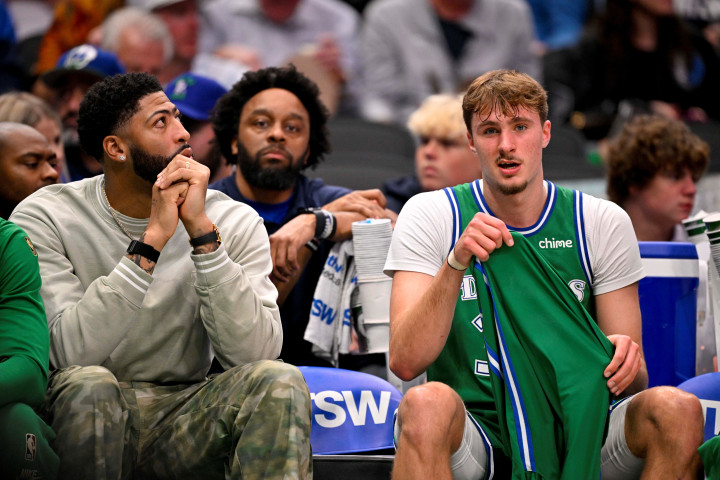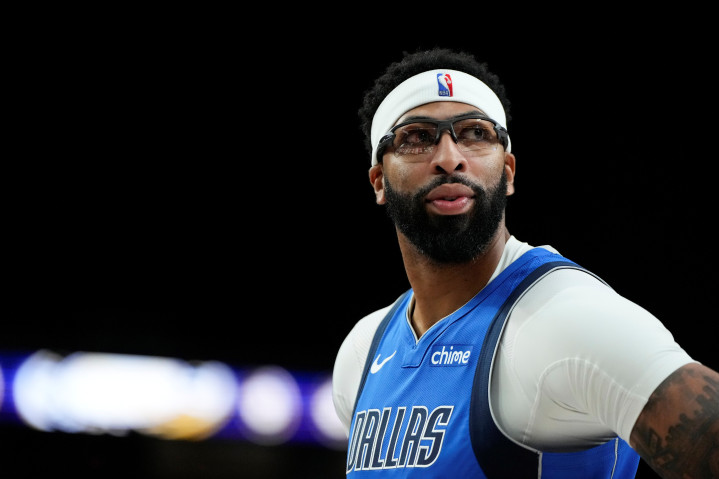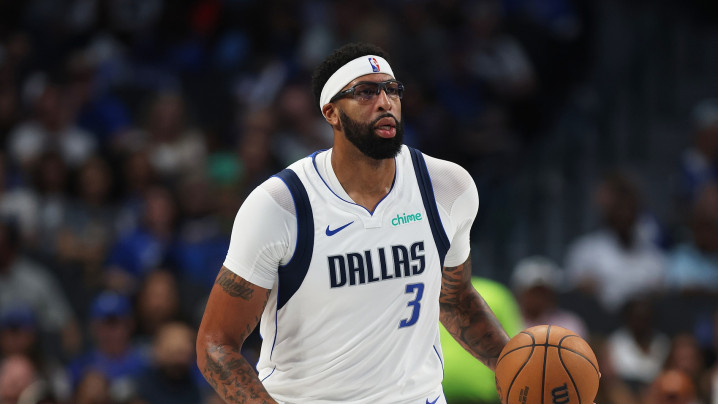289 Sports > Basketball > Why is the trading value of thick eyebrows so low? Does the second villain think he can compete for the championship with him?
Why is the trading value of thick eyebrows so low? Does the second villain think he can compete for the championship with him?

Anthony Davis ranks second on Fanspo's NBA Trade Simulator's popular player list, but I wouldn't recommend trying to come up with a realistic trade plan for him. This is frustrating and has the potential to put you in a bad mood.
In theory, Davis' situation should be simple: He will turn 33 in March, and the Dallas Mavericks' team-building rhythm does not match his peak period. For both parties, sending him to a team that aims to win the championship in exchange for a group of young players and draft picks may be a better choice.
However, all experts believe that the Mavericks cannot expect any team to pay an exorbitant price for Davis. It doesn’t matter that he was the centerpiece of the Luka Doncic trade less than 10 months ago, or that he was an All-NBA second-team selection 17 months ago. "There aren't a lot of teams lining up to get Davis," ESPN's Tim Bontemps said. Shortly after Nico Harrison was fired, Zach Lowe said that the gap between what the Mavericks paid to acquire Davis and what they would ultimately get in exchange for him "would set a world record for the largest single-player trade return differential in the history of professional sports."

The core problem is not that Davis weighed much more than his normal playing weight in training camp, nor that he suffered a calf strain just one week into the regular season. The real issue is his contract.
Davis’s annual salary this season is US$54.1 million, and his contract value next season is US$58.5 million. He also has a player option worth US$62.8 million in the 2027-28 season, when he will be 35 years old. In August next year, he will be eligible to sign a contract extension that can last up to four years with a total amount of up to $275 million, including an annual salary of up to $76 million in the 2030-31 season, when he will be 38 years old.
The first obstacle is to find a team that can gather the trading chips at the operational level. The management of this team must not only believe that after acquiring Davis, the team will be able to join the ranks of championship contenders; they must also believe that even if the losses caused by sending away traded players are included, the team will still have the strength to compete for the championship after acquiring Davis. The total salary of these traded players in the 2025-26 season must reach at least US$43.1 million, and the team's total salary after the transaction cannot exceed the first luxury tax line of the salary cap.
The second obstacle is finding a team that isn't afraid of paying Davis a hefty salary in the future. This team does not necessarily need to be willing to provide him with a four-year maximum salary extension next summer, but it must be confident that it can renew his contract on terms more beneficial to the team, or be willing to accept Davis as a free agent in 2027, or to exercise the player option for the 2027-28 season. It is understandably difficult to negotiate with a future Hall of Famer who is around 35 years old.

And these obstacles are only one side of the problem. Assuming Davis shines when he returns to Los Angeles on Friday to face his former team, performs at an All-NBA level over the next few weeks, and prompts some teams to want to trade for him; are these potential suitors willing — or even able — to send him multiple first-round picks? If not, will the Mavericks be interested in the young players on the table? It's easy to say the Mavericks "should" trade Davis, but I've yet to see any fictitious trade package involving him that both looks feasible and is too good a trade for the Mavericks to pass up. It's unclear what conditions would need to be met before they would accept an offer.
If this all sounds familiar, it’s because we have seen similar situations with many stars under the NBA’s latest collective bargaining agreement framework. The trade market for Jimmy Butler was not hot at the time. In the end, the Miami Heat accepted a deal that included Andrew Wiggins, Davion Mitchell, Kyle Anderson and a 2025 first-round pick (the final pick was No. 20, and Kaspars Yakousionis was selected), sending Butler, Josh Richardson and two second-round picks. What the Phoenix Suns got in return for Kevin Durant was a drop in the bucket compared to what they paid to acquire him. The trade that ended Brandon Ingram's career with the New Orleans Pelicans wasn't technically a pure salary clearing -- they got a protected first-round pick in return -- but it felt pretty much like it, didn't it?

In the latest newsletter written by Jack Fisher for "TheSteinLine", he mentioned that the Charlotte Hornets do not intend to trade LaMelo Ball, in part because they are "unlikely to get the offer they expect." He called the situation "somewhat reminiscent of Anthony Davis' situation in Dallas." He also wrote that the Sacramento Kings "are also unlikely to get a big return" if they trade Sabonis, Zach LaVine or DeMar DeRozan. These players are all former All-Stars, and there's no consensus around the league that they've fallen into mediocrity. However, in addition to DeRozan's annual salary this season being less than $38 million, it will not be easy to trade for any of them in the current market environment.
Generally speaking, teams with excellent records do not want to get into complicated situations. They don't want to destroy a good system, completely change the direction of the team midway through the season, and they don't want to put themselves in salary cap trouble for years to come. As trade season approaches - the unofficial trade season will begin on December 15, when most players who signed new contracts last summer will be eligible for trade - big-name stars like Davis will inevitably receive the most attention, but they will not be the most pursued players..
If you are a team looking to strengthen, the ideal target is likely to be a young player who can complement the core of the team on both offense and defense, can defend multiple positions, does not require a lot of ball possessions, and has a relatively low contract. This is why the only player ranked ahead of Davis on the Fanspo website's NBA Trade Simulator hot player list is a fourth-year guard, Keon Ellis of the Kings, whose annual salary this season is only $2.3 million. According to "TheSteinLine", more than half of the teams in the league have inquired about his situation.
source:7m cn netRelated Posts
The Rockets injured another person! The second center is absent from the Warriors, the advantage of the twin towers is gone, and 4 core members are injured.
BasketballIf a team wants to achieve good results in the regular season or even the playoffs, having a well-organized team is an essential prerequisite. Just like some teams are originally very strong, but some core players cannot play due to injuries, then i...
moreThe Los Angeles Magic broke the enemy s boat! Doncic scored 24 points in the first quarter and scored 43 points, 9 rebounds and 13 assists to achieve a triple-double.
BasketballNovember 26th: In the NBA Cup group match, the Lakers defeated the Clippers 135-118 at home. In this game, Lakers star Doncic was in hot form and performed well. Especially in the first quarter of the game, he scored 24 points and 3 assists in a sin...
morePlayers playing time is fragmented and the entire team is depressed. What is the Grizzlies coach doing?
Basketball. On the court, the Grizzlies don't look like a normal team, but like a group of "conspicuous bags" who are messing around. The experienced veteran players cannot compete with these kids. Jaren Jackson Jr., as the true core of the Grizz...
more
Hot Posts
- With 5 consecutive victories in hand, the Rockets still have 3 gains to win. They have found Ethan as a substitute. One play style cannot become the norm.
- Suns coach: It’s never easy to limit Wenban. This is our best defensive performance this season.
- Dark horse! The Bulls officially revealed the first record in the Eastern Conference: We love 5-0, keep working hard
- Last season, averaged 9.7 points and 2.2 rebounds! Jersey Reporter: Coffey wore No. 17 jersey in the Bucks
- 18 years of the showdown in the league to looking up to the new king, the legend continues
- Durant himself never thought he could enjoy super high treatment in his life, but he came to the right place!
- The park championship has no value? American News: The Lakers have better psychological adjustment and beat many stars all the way
- As strong as Jokic is only the No. 41 pick in the second round in 2014. Who are the top five in the same class? Tanhua became an MVP
- Well-known reporter: The Lakers center may get a contract of 5.2 million, but he may still stay with the Lakers
- The logo of the NBA tough guy: Kobe s Achilles tendon, Rose s knees, Green s heart
Recent Posts
-
The remaining schedule of the Casino Summer League: The day after tomorrow 09: 30 Trail Blazers ended with the Suns, and the final started at 10:00 on the 21st
-
Cole has completed the construction of the three young masters framework! Bojie is comprehensive, and Moody Kuming has added strategic significance!
-
Valanciunas bids farewell to the NBA, what should I do with the Nuggets?
-
The Lakers new choice for the second round pick? Has tried 5+5 older centers, only two advantages are worth looking forward to
-
There is a difference! Durant is the core of the team, but not the core of the tacticality?
-
Kidd talks about Klay s continued slump: He must continue to shoot. Now it s just that the ball is missing.
-
Scored the highest score of his career against the Warriors! Is the Spurs abandoner gradually gaining a foothold in the Trail Blazers?
-
Today 6: Lakers traded 6 for 1 to get Anthony Davis
-
James: I like the playoffs but I don t think fans will like the whole regular season.
-
The Clippers reinforcement is quite targeted, the two centers have top-notch frame protection capabilities, and the Bucks are also improving?